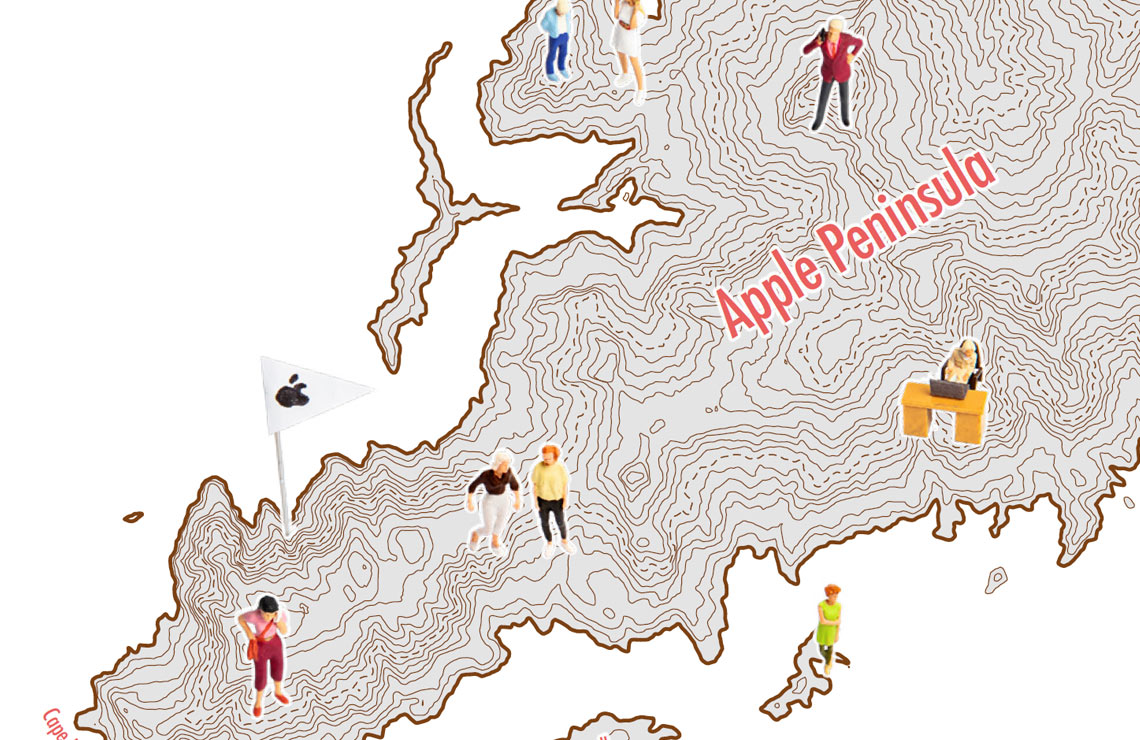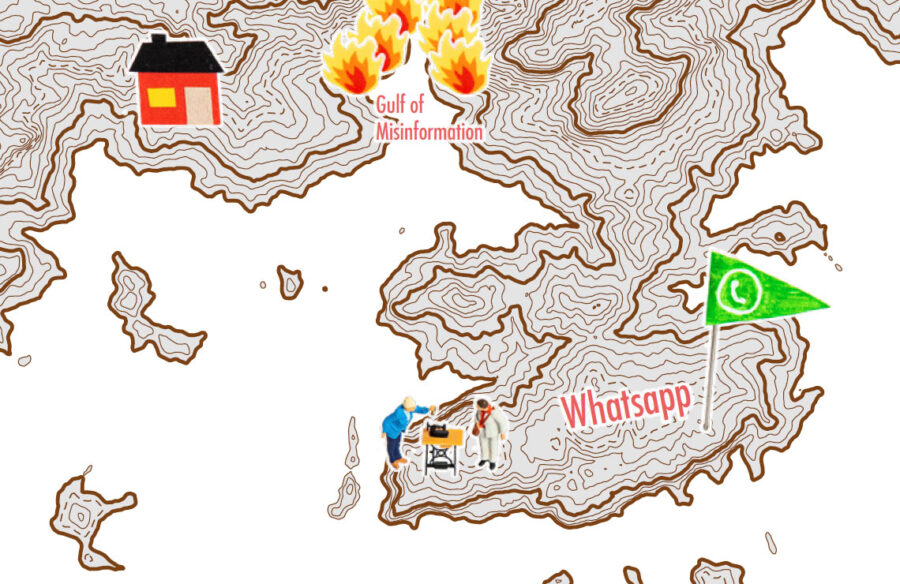
Stuck in the world of big tech
It’s been a rough few years for a handful of US tech companies, due to a seemingly endless stream of scandals and harsh criticism from politicians on both sides of the Atlantic. The result? “Big Tech” is bigger than ever. But what if they have only started to flex their muscles?
Several executives reacted with shock, according to the people in the room. The proposal meant crossing a line, unleashing a hitherto unused weapon. The code name was “Project Amplify”, and it was a new strategy that social media behemoth Facebook hatched in a meeting in early 2021, as reported by the New York Times. The mission: to improve Facebook’s image by using the site’s News Feed-function to promote stories that put the company in a positive light.
The potential impact is enormous. News Feed is Facebook’s most valuable asset. It’s the algorithm that decides what is shown to users when they log in to the site. In essence, it is the “window to the world” for their users, who, totalling nearly three billion, constitute more than a third of all humans on planet Earth.
“Truth” is now the same as “what makes Facebook look good”
For many years Facebook founder Mark Zuckerberg defended the company’s policy on free speech with the mantra that the social network should not be the “arbiter of truth” online, i.e., they would not censor content that people posted. Critics would say that Facebook has been doing this all along, letting its algorithms prioritise what is presented to users. What shows up in the News Feed is what people perceive as important, a form of personal truth for every individual. “Project Amplify” would mean something entirely new. By actively promoting positive news stories about the company, “truth” is now the same as “what makes Facebook look good”.
Silicon Valley veteran and social media-critic Jaron Lanier referred to the major social media networks as “gigantic manipulation machines”, possessing the power to alter emotions and political views among billions of people by pulling digital levers. Now Facebook has decided to use its machine for its own purpose.
We will return to the implications of this, but first, it is important to understand why Facebook and Mark Zuckerberg would want to do this. It is no bold assertion to say that Facebook’s public image is in acute need of a facelift. The company has been plagued by scandals for years. In 2018, it was revealed that the company Cambridge Analytica had harvested data from 87 million Facebook users, data that had been used in Donald Trump’s presidential campaign. The revelation not only tarnished Facebook’s reputation, but it also had real financial consequences. When the story broke in March 2018, Facebook’s stock tanked. In July the same year, Facebook announced that growth had slowed down due to the scandal. The stock fell 20 percent in one day. In a few months, 200 billion USD of the company’s market capitalisation was wiped out.
Facebook’s reaction can be summarised as follows: we are sorry and promise to do better. This has been repeated every time new, negative stories about the company emerge, such as the spread of disinformation, the negative impact Facebook’s product has on the mental health of young people, and how the network was used to instigate genocide in Myanmar, among other things.
If the stock market is a reliable gauge of the future, and it often is, the conclusion is clear: these companies are untouchable
But behind the many apologies it seems Facebook has continued with business as usual. In September 2021, the Wall Street Journal published “The Facebook Files”, a damning investigation showing that the company, including Mark Zuckerberg, was very aware of the harm the platform was causing. The company’s own researchers identified problems in report after report, but the company chose not to fix them, despite public vows to do so.
From the company’s perspective, its strategy has been a success. Advertising revenues have continued to rise and in autumn 2021, Facebook’s stock market value broke one trillion USD, double of what it was before Cambridge Analytica.
The same can be said of the other tech giants. Companies including Google, Amazon and Apple have been at the crosshairs of public debate for years, both for alleged abuse of their dominant market positions and for the negative effect their products and business models can have on people and society.
But if the stock market is a reliable gauge of the future, and it often is, the conclusion is clear: these companies are untouchable. Despite a storm of criticism, court cases and billion-dollar fines, stocks have continued to propel ever upwards. How is this possible? Let’s start with breaking down the different ways Big Tech dominates the world today.
When discussing this topic, parallels are often drawn to the influential corporations of the late 1800s and early 1900s, Standard Oil for example. These comparisons are misleading. Standard Oil and its owner John D. Rockefeller could never dream of the amount of power that rests in the hands of the Silicon Valley-titans of the 2020s.
The new economic superpower
In 2010, the total market cap of Apple, Google, Microsoft, Facebook and Amazon was more than 700 billion USD. That was equivalent to the GDP of the Netherlands. The ascent had been amazingly fast; at this point Amazon was 16 years old, Google twelve and Facebook only six. In autumn 2021, their combined value had reached 9,500 billion USD, more than the GDP for Japan and Germany combined. The total annual revenue for these five corporations is north of one trillion dollars, more than the defence budgets of USA, China, and Russia combined.
The market superpowers
Facebook owns four of the five largest social media networks in the world. Google, owner of the second largest (Youtube), has a 92 percent market share on search. Apple’s and Google’s operating systems, IOS and Android, control 99 percent of the global smart phone market outside of China. Apple takes in 65 percent of the global revenue on mobile apps, and Amazon has 50 percent of the e-commerce market in the US, as well as 32 percent of the global market for cloud services, followed by Microsoft. The list goes on. This not only creates huge profits but also creates an enormous asset in form of the 21st century’s most valuable commodity: data.
The innovation superpowers
Up to 50 percent of the venture capital raised by start-ups circles back to Google and Facebook in the form of advertising, almost as a “tax on innovation”. If new, competing services emerge, Big Tech can either try to buy them or launch competing products. Their headway in terms of resources and user base makes it extremely difficult – if not impossible – to pose a real threat.
The perception superpowers
Twenty years after the 9/11 terrorist attacks, one in 16 Americans believe the US government knew about the attacks and let them happen. Conspiracy theories and disinformation have become the new normal, and research has shown social media plays an important role. What Google and Facebook choose to allow, or not allow, on their platforms shapes our view of the world. In 2012, Facebook conducted an experiment among 700,000 users to see if their states of mind could be altered by changes in News Feed. The answer was yes.
The infrastructure superpowers
In December 2020, Google went down, meaning users could not access Gmail, Google Docs or Youtube. Although the outage only lasted 45 minutes, it made headlines all over the globe. The same thing happened to Facebook in October 2021. As an expert said to CNN: “For many people Facebook is the same as internet”. After the 2008 financial crisis it was clear that a small number of banks were “systemically important”. This is now very true for Big Tech. Serious disruptions in their services would quickly have severe and costly consequences.
The political superpowers
Big Tech has surpassed Big Oil as the biggest spenders on lobbying in Washington D.C., with an increase in spending from 20 to 124 million USD between 2010 and 2020. In the election cycle of 2020, a total of 2.1 billion USD was spent on political ads on Facebook and Google. In a manifest published in 2017, Mark Zuckerberg noted that in elections across the world “the candidate with the largest and most engaged following on Facebook usually wins”. In other words: use us or you lose.
The capital markets superpowers
It could be argued that the stock market has become the most important gauge for global decision-makers. It takes decades to make them do anything to combat climate change, but if stocks drop dramatically, decisive action from politicians and central banks are delivered within days or even hours. This was last seen in early 2020, when fears of the economic impact of the pandemic brought the Dow Jones down by 13 percent in one day. The direction of the stock market is, in turn, more and more intertwined with that of Big Tech. Apple, Google, Facebook, Amazon and Microsoft constitute a quarter of the S&P 500 index.
The AI superpowers
“Dark patterns”. That is what scientists call the tricks that digital companies deploy to manipulate users. Sometimes the purpose can be quite trivial, like making people sign up for a newsletter or share their email. The point is that you as a user do something that you didn’t intend to do. With artificial intelligence these tools become more and more powerful and potentially deceptive. The more data an AI-algorithm can use to train on, the more effective it becomes. This places Big Tech in a unique position to use these techniques. The problem with this is best summed up by Meredith Whittaker, a former Google engineer and now head of the AI Now Institute at New York University: “You never see these companies picking ethics over revenue.”
In all the ways mentioned above, the power of Big Tech is growing bigger every day. It is important to say that not everybody thinks this is a problem. However, it seems like there is a consensus among democratically-elected leaders in both the U.S. and Europe that the influence of these companies must be reined in. The U.S. and the European Union recently agreed to take a more unified approach in regulating big technology firms. In fact, even the people who work in the industry share this view. In a survey of 1,578 tech employees made by Protocol, 78 percent said that Big Tech is too powerful.
So, what can be done? A variety of options are already on the table, from forcing companies to break up to altering laws that give social media companies a free pass compared to traditional media. If the New York Times publishes hate speech they are liable, when Facebook does the same, they are not. In the US, this legislation is referred to as “Section 230”, and there is a debate around whether to change it. At the same time, numerous lawsuits have been filed around the world against the Big Tech-companies on anti-trust issues. The stock market has sent the message that the idea that any of these measures could seriously harm these companies is simply unfounded. And that view could very well be justified. There are several reasons why Big Tech-titans can sleep well at night. Let’s run through some of them.
Breaking up is almost impossible
The businesses of Big Tech are deeply interconnected. It would take years of litigation to make such a decision a reality. With 300 billion dollars of annual profits, the legal coffers of Silicon Valley are limitless.
Fines would have to be astronomical to make a difference
Between 2017 and 2019, the EU slammed Google with a total of eight billion USD in fines. That is less than seven percent of the company’s pre-tax profit during those three years. As the stock market often regards fines as a “one-off”, it is not clear if even larger fines would hurt the market cap at all.
Too drastic of measures could trigger a stock crash
In theory, politicians could of course make new laws that severely hurt Big Tech. This would very likely lead to correction of their stock prices, which in turn would weigh heavily on the start-up ecosystem and the economy at-large. To have voters lose trillions of dollars, or even worse their jobs, is not a price any politician is willing to pay.
The companies could fight back
This is the most underestimated scenario of all. What if Google eliminated negative news stories about Google from searches, or they monitored Gmail and Google Docs to stop whistle-blowers or investigative reporters?
What if Facebook took down the accounts of politicians who are critical of Big Tech? What if Youtube only recommended documentaries that showed how fantastic Silicon Valley is for humanity?
This might all seem rather dystopian, but the question must be asked. After all, anything that can be done with technology tends to be done. With Facebooks “Project Amplify”, this is already inching towards reality. Most importantly, what could anyone do to prevent this? The answer is: nothing.
As things stand now, Facebook and Google are controlled by Mark Zuckerberg and Larry Page/Sergey Brin who own more than 50 percent of the voting power. An American president can be thrown out of office, but no one can sack Mark Zuckerberg. And the reality is that Big Tech can use the power of their platforms for more or less any purpose they please. As Facebook whistle-blower Frances Haugen told CBS 60 minutes:
“The thing I saw at Facebook over and over again was there were conflicts of interest between what was good for the public and what was good for Facebook, and Facebook over and over again chose to optimise for its own interests, like making more money.”
To satisfy Wall Street, Big Tech-giants must deliver constant growth and more profits every year
Here we arrive at the crux of the problem. Silicon Valley’s algorithms govern the world, but these giants are in turn governed by an even more powerful algorithm: the paradigm that is called shareholder value.
To satisfy Wall Street, Big Tech-giants must deliver constant growth and more profits every year. And in the choice between ethics and profit, the answer is, more often than not, profits.
Silicon Valley author and entrepreneur Tim O’Reilly has called Big Tech “slaves under a super-AI that has gone rogue” – meaning the financial markets.
Breaking out of this cycle is easier said than done. Companies like Apple, Google and Facebook use their stock to pay their employees, which means they are highly dependent on stock prices rising.
But bad ethics also runs the risk of alienating these same employees. Internal protests have rocked Google, Amazon, and Microsoft in recent years.
Hurt society or hurt the stock price? Lose staff over scandals or over bad pay? These are the dilemmas that the most powerful companies in history face. Whether Big Tech has really become too-big-to-stop remains to be seen. Ultimately the power rests with you. Without the billions of daily users, Silicon Valley’s influence amounts to exactly zero.
So, if your kids or grandkids one day ask how a few individuals acquired so much wealth and power, the answer is simple: we gave it to them.

Andreas Cervenka
Columnist, Aftonbladet
Years in Schibsted: 10 years at SvD (2007– 2017), at Aftonbladet from December 2021.

